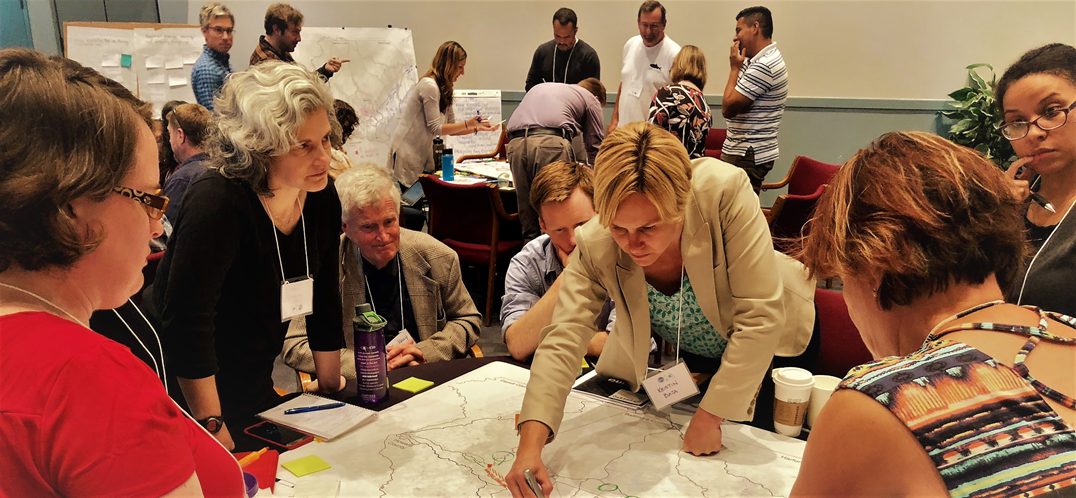Scenarios Working Group
Working Group Leads: David Iwaniec, Timon McPhearson, Tischa Muñoz-Erickson, Elizabeth Cook, Nancy Grimm, Marta Berbés-Blázquez
Postdoc Lead: Lelani Mannetti
Grad Lead: Robert Lloyd
In the face of climate uncertainty, scenarios allow us to explore possible futures, the assumptions they depend upon, and the courses of action that could bring them about.
The overarching goal of the Urban Resilience to Extreme Events Sustainability Research Network (UREx SRN) project is to enhance the urban resilience of coupled social, ecological, and built infrastructure systems (SETS) in the face of rising challenges to cities from global climate change. To better respond to a variety of extreme events and to strategically enhance urban planning and development, city governments need to anticipate and guide infrastructure decisions. With the goal of addressing this challenge, the Scenarios Working Group, together with city teams, students, researchers and collaborators across the network, generate positive future scenarios that are resilient, sustainable and just.
Visioning Workshops
Through participatory scenario workshops, we ask: “What are the envisioned goals for 2080, and what courses of action will allow the transformation of cities to sustainable futures?”
During scenario workshops; practitioners, administrators, decision makers, civic and community organization leaders, designers/architects, professors, and students from across each network city get together during a one-day event. Collectively, participants develop both adaptive scenarios to future extreme events as well as transformative scenarios that aspire to radically change their city’s infrastructure and ability to respond to extreme events. Participants work in small groups to jointly develop several visions for the future of their city in 2080. Through various activities, the participants define goals and strategies for each scenario. At the end of the workshop the participants present their visions for their city in 2080 with narratives and visual illustrations.
Synthesis
Through scenario co-development and synthesis, we ask: “What transition pathways can be envisioned that will allow the transformation of cities to sustainable futures?”
Using the products from the scenario workshops, the Scenarios Working Group produces quantitative and qualitative outputs to visualize the futures of the network cities in 2080. Primary products include 1) land use change models to explore and evaluate different outcomes of different strategies and visions, and 2) a qualitative assessment of resilience, equity, sustainability and the potential for transformative change.
Alongside data analysis and synthesis, the Scenarios Working Group and city teams continue to integrate perspectives, experiences and knowledge. Researchers and students within the network are conducting several comparative studies, while others collaborate with practitioners to delve deeper into issues surrounding climate change, social inequalities, environmental health and urban infrastructure.
Several follow-up workshops have occured, and in each case have taken on slightly different forms. In San Juan, Puerto Rico, the aim was to collectively revise initial scenarios and to discuss the extent to which the proposed strategies need to be refined after having experienced an extreme hurricane event. While in Baltimore, by partnering with the Urban Waters Partnership, a list of high priority strategies was generated to help build resilience in the Central Maryland region. Generally, the overarching aim of the follow-up workshop is to refine and revise the scenarios with any new ambitions, values, and desires, or any other considerations overlooked since the initial workshop.
In this manner, the Scenarios Working Group uses the envisioned strategies as a way to inspire and promote future sustainability and resilience, and as a platform for further collaborations and resilience planning in an effort to help cities transform to sustainable futures.






1 Comment